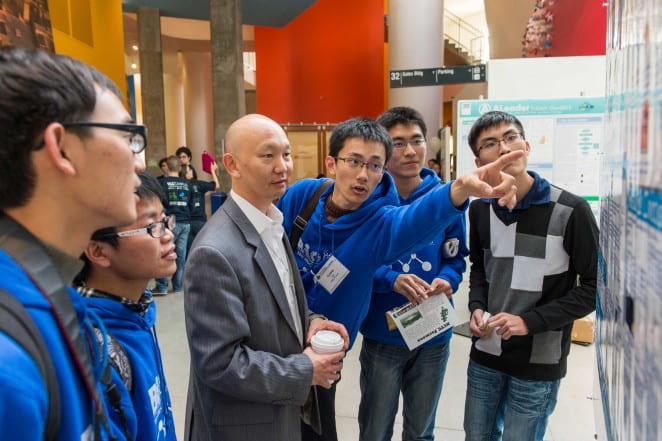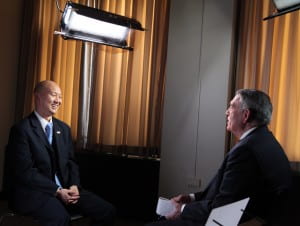
FBI agents aren’t typically greeted with open arms by members of the science community. There’s an inherent distrust of “feds” who come snooping around their research labs.
But Ed You ’91 has an advantage over other government officials when trying to win the confidence – and cooperation – of scientists: He’s one of them.
He has plenty of lab experience, going back to his college days, when he majored in biological sciences at UC Irvine. His background has proven invaluable in his role as supervisory special agent in the FBI’s Weapons of Mass Destruction Directorate, Biological Countermeasures Unit.
“It’s helped me bridge the divide between law enforcement and science and change negative attitudes toward the bureau,” You says.
He’s working with scientists to keep their research methods and materials from falling into the hands of terrorists and other criminals.
“Our goal is stopping the acquisition and use of weapons of mass destruction,” You says. “We’re looking at the potential for legitimate research to be used for nefarious purposes.
“Espionage, domestic and international terrorism, individuals trying to steal intellectual property, even workplace violence in a lab setting – it’s a world the science community isn’t educated about.”
Biological agents – including bacteria, toxins and viruses such as modified avian influenza – could cause great harm if intentionally released by terrorists.
“There’s been a history of biology being abused or exploited for criminal acts,” You notes.
In 2001, deadly anthrax spores were sent through the mail to several media outlets and two U.S. senators, killing five people and infecting 17 others. The attack was one reason the FBI created the WMD Directorate in 2006 to deal with incidents involving nuclear, radiological, biological or chemical weapons.

You is interviewed on “Dan Rather Reports” in 2013 about synthetic biology and how the FBI protects research.
Photo courtesy of Ed You
You’s focus is synthetic biology, a rapidly emerging field that’s giving scientists the unprecedented power to re-create the building blocks of life. Instead of splicing genes from different species, they stitch together pieces of synthetic DNA to produce organisms that don’t exist in nature.
Still in its infancy, synthetic biology could revolutionize the pharmaceuticals industry, food production, the quest for renewable fuels, and other sectors. It holds great promise – and carries great risk. For instance, You says, it could be absconded to someday manufacture illicit narcotics.
“If potent narcotics could be produced from merely brewing a modified strain of yeast, for example, it would have a profound impact on society,” as methamphetamine has had, he says. “It would make it incredibly challenging for entities like the FBI and DEA [Drug Enforcement Administration] to interdict such activity. We’d be going from ‘Breaking Bad’ to ‘Brewing Bad.’”
In 2002, scientists at Stony Brook University in New York used synthetic biology to re-create the polio virus – raising fears that in the wrong hands such deadly material could become a potent weapon.
You strives to educate those engaged in biotech research about the risks and how to recognize and report suspicious activity.
His unit also has developed an outreach program in which WMD coordinators in FBI offices nationwide build relationships with local contacts in academia, institutions, industry and other organizations. The collaboration has encouraged the evolution from just “do no harm” to a “not on my watch” mentality in labs. (The Los Angeles office has worked with UCI’s biosafety training program, and in 2012 the university hosted a biosecurity workshop presented by the FBI.)
“In the past, the science community has been viewed as the source of the [security] problem and in need of more training in ethics and responsibility,” You says. “But coming from the lab, I determined that scientists are absolutely part of the solution, whether they’re students, tenured faculty members or university administrators.”
You began his career as a scientist after earning a bachelor’s degree in biological sciences at UCI in 1991 and a master’s in biochemistry & molecular biology at USC. He then spent three years at the biotech firm Amgen Inc. conducting cancer research.
“I was always interested in the life sciences and fascinated by the whole aspect of doing research,” You says. “I liked pushing the envelope.”
But the horrific events of 9/11 radically changed the course of his career.
They “galvanized me to do something to prevent future terrorist attacks,” he says. “I wanted to contribute to society more directly. So I applied to the FBI and was surprised to find that I was accepted based on my biology background and research experience.”
In 2005, after graduating from the FBI National Academy in Quantico, Va., You joined the agency’s Los Angeles Joint Terrorism Task Force. Four years later, he was promoted to the WMD Directorate in Washington, D.C.
He’s active in policymaking, serving on two National Academies committees – the Forum on Microbial Threats and the Forum on Synthetic Biology – and multiple organizations dealing with biosecurity, including the National Science Advisory Board for Biosecurity and the National Security Council working group on countering biological threats. You has twice been part of the U.S. delegation to the United Nations’ Biological Weapons Convention in Geneva and has given presentations to the European Commission.
He has visited UCI several times to meet with administrators on biosecurity policy and to talk to students about alternative careers in the life sciences.
“There’s a huge need for policymakers who have a background in science, and there’s potential for working for the FBI,” You says. “They play a vital role in safeguarding research and the future.”
He encourages students to be passionate about their work, and to become teachers and mentors, so that they can encourage a new generation to “always be the guardians of science.”
– Kathryn Bold, UC Irvine
Top photo: Ed You ’91 leads a “Safeguarding Science” workshop for undergraduates from around the world at the 2014 International Genetically Engineered Machine synthetic biology competition in Boston.
Photo courtesy of Ed You